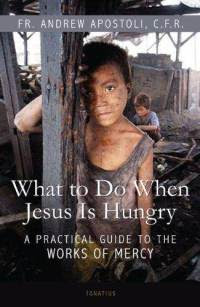Dorothy Day once said that everything a Christian does should be connected to the works of mercy. And that’s a pithy summary of the Christian life. These fourteen actions, traditionally divided into the spiritual and corporal works, bring to life Jesus’ command to “love your neighbor as yourself.”
Though they’re not explicitly listed out in Scripture, they find their source in Jesus’ Sermon on the Mount and his Judgement of the Nations. The spiritual works include:
- Instructing the uniformed
- Counseling the doubtful
- Admonishing sinners
- Bearing wrongs patiently
- Forgiving offenses willingly
- Comforting the afflicted
- Praying for the living, the sick, and the dead
The corporal works include:
- Feeding the hungry
- Giving drink to the thirsty
- Sheltering the homeless
- Clothing the naked
- Visiting those in prison
- Visiting the sick
- Burying the dead
If you’re like me, you look at those practices with a bit of regret. For instance, I can’t remember the last time I visited someone in prison and I curl up just thinking about “admonishing sinners”.
If that sounds like you, you’ll gain a lot from a new book titled What to Do When Jesus Is Hungry: A Practical Guide to the Works of Mercy (Ignatius, paperback, 188 pages). In the book, Fr. Andrew Apostoli offers advice on how we can carry out these works in the modern world. The book is filled with personal illustrations that are colorful and creative. Apostoli also weaves in Biblical commentary and stories from saints like St. Felicity, St. Francis, and St. Padre Pio. All of this makes the book a one-stop shop for the works of mercy.
One hesitancy I sometimes have with books like this is that the author often encourages us to do things that he doesn’t do himself. So for instance, he’ll tell you to go out and share a meal with the poor when he hasn’t talked to a poor person in years.
Fr. Apostoli is not like this, though. He has oriented his whole life around these works, making his guide especially valuable. He was a founding member of the Franciscan Friars of the Renewal, a religious order that follows in the footsteps of St. Francis. They dedicate themselves specifically to the works of mercy so for Fr. Apostoli, the advice in the book is not some pie-in-the-sky idealism. It’s lived wisdom, gleaned from years of successes and failures.
If Dorothy Day was right that each of us should ground our lives on the works of mercy, then Fr. Apostoli’s book What to Do When Jesus Is Hungry should be a necessary read for all of us.

